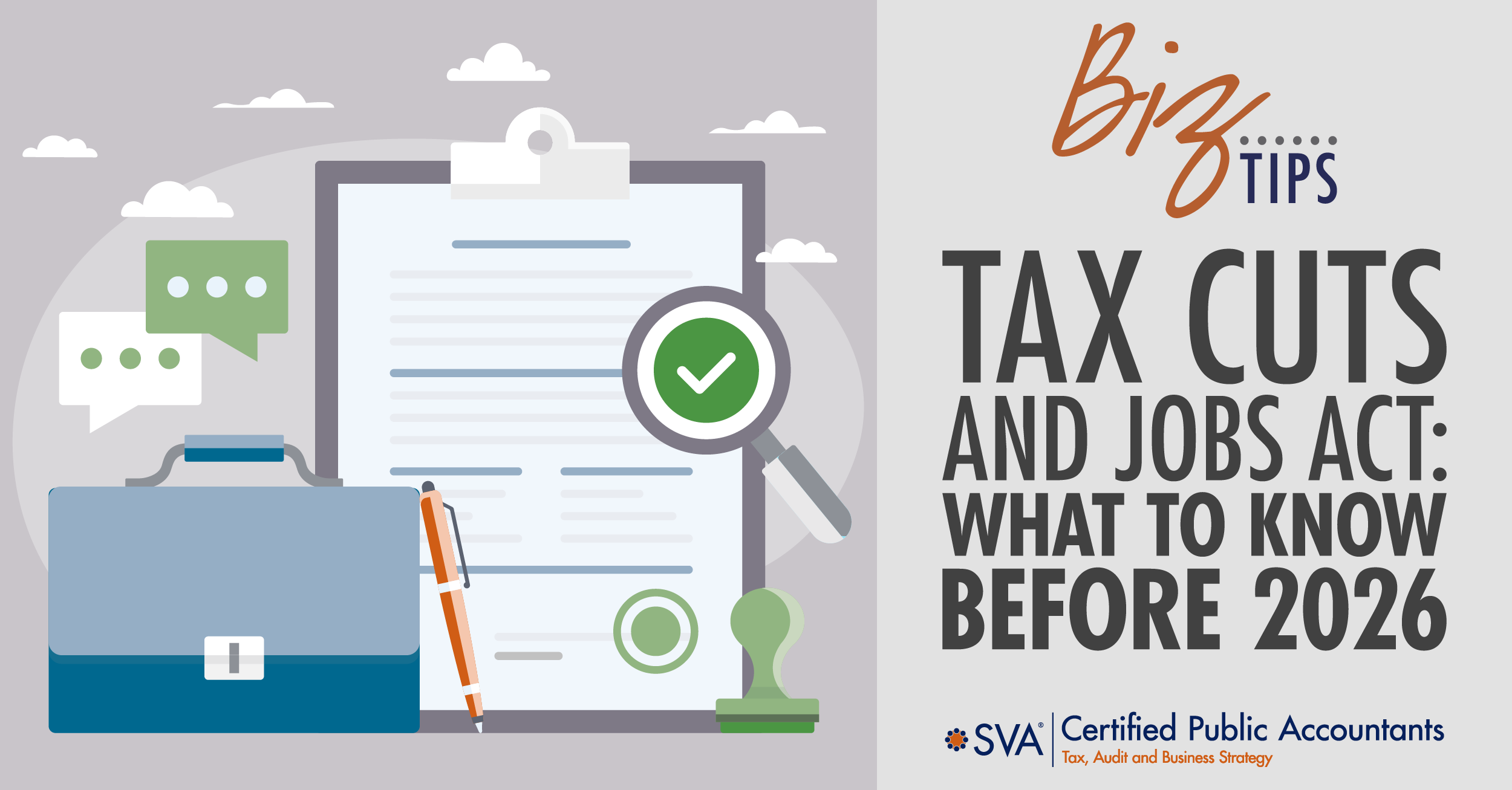| Highlights: |
- The Tax Cuts and Jobs Act (TCJA) of 2017 made sweeping changes to U.S. tax law, but many individual and business provisions are set to expire after 2025, affecting credits, deductions, and rates.
- Key changes in 2026 include reversion of child tax credit limits, higher marginal tax brackets, reversal of standard deduction amounts, and loss of the 20 % QBI pass-through deduction.
- Taxpayers should plan ahead for adjustments in estate and gift tax exclusions, SALT deduction rules, mortgage interest deductions, and miscellaneous itemized deductions starting in 2026.
|
The Tax Cuts and Jobs Act (TCJA), enacted in 2017, was the most significant overhaul of the tax system since the Tax Reform Act of 1986. Many of the tax-cutting measures included in the TCJA will expire at the end of 2025.
Major TCJA Changes
Below we highlight the major changes you can expect to see once these provisions end on December 31, 2025. Stay tuned to this page for any developments regarding the TCJA – future legislation may impact some of these areas.
Child Tax Credit
Current State:
The child tax credit allows a taxpayer to reduce their federal income liability for qualifying children. Some lower-income taxpayers are eligible to receive some or all of the child tax credit as a refundable portion of the credit. This is known as the additional child tax credit, or ACTC. There is a phase-out threshold for higher-income taxpayers.
The TCJA increased the maximum credit to $2,000 per child and the maximum ACTC to $1,400 per child. The phaseout threshold is $200,000 for unmarried filers or $400,000 for married filers.
| 2026 State |
| The child tax credit will revert to its pre-TCJA specifications. The maximum credit and maximum ACTC per child will both be $1,000. The phaseout threshold is $75,000 for unmarried filers and $110,000 for married filers. |
Estate and Gift Tax
Current State:
These taxes have a 40% rate after a fixed amount is excluded. The TCJA changed the exclusion rate from $5 million to $10 million. Adjusted for inflation, the current exclusion rate is $13,610,000.
| 2026 State |
| The estate and gift tax exclusion amount will revert back to $5 million, adjusted annually for inflation. |
Marginal Tax Rates
Current State:
Marginal tax rates are applied to an individual’s taxable income in order to calculate their tax liability before any credits are claimed. The income ranges are adjusted for inflation each year and are commonly referred to as a tax bracket.
The TCJA specified the marginal tax rates as 10%, 12%, 22%, 24%, 32%, 35%, and 37%.
| 2026 State |
| Marginal tax rates will revert back to pre-TCJA levels. These rates will be 10%, 15%, 25%, 28%, 33%, 35%, and 39.6%. Income ranges for each bracket will continue to be adjusted for inflation annually. |
Miscellaneous Itemized Deductions
Current State:
When filing taxes, individuals can take a standard deduction or itemize deductions to reduce taxable income. The TCJA eliminated some deductions that were previously able to be itemized, such as tax preparation fees and employee expenses your employer did not reimburse you for.
| 2026 State |
| All miscellaneous items that the TCJA eliminated will again be able to be itemized for deduction. However, all miscellaneous expenses added together must be more than 2% of an individuals adjusted gross income before it can be deducted. |
Mortgage Interest Deduction
Current State:
Taxpayers who itemize their deductions can deduct interest paid on the first $750,000 ($375,000 for married filing separately) of mortgage debt. If the taxpayer has more than one home, this deduction applies to the first and second homes combined. The limitation only applies to new loans incurred after December 15, 2017.
If the mortgage debt incurred on or before December 15, 2017, taxpayers who itemize can deduct interest on the first $1 million ($500,000 for married filing separately) of combined mortgage debt.
If the taxpayer holds a home equity loan or line of credit, its interest cannot be deducted if the money was used for something other than buying, building, or substantially improving the home.
| 2026 State |
| The $750,000 limitation will increase to $1 million, regardless of when the mortgage originated. In addition, interest on the first $100,000 of home equity debt can be deducted, no matter what the funds were used for. |
Personal Exemptions
Current State:
Before the TCJA was enacted, taxpayers could claim personal exemptions to lower their adjusted gross income. Personal exemptions included themselves, their spouse (if applicable), and any dependents. The TCJA suspended personal exemptions, although taxpayers could reduce their adjusted gross income with other TCJA provisions, such as a higher standard deduction and the child tax credit.
| 2026 State |
| Personal exemptions will revert to their pre-TCJA levels and then be adjusted for inflation. |
Qualified Business Income (QBI) Deduction
Current State:
This is a deduction for pass-through business income and is commonly referred to as the “Section 199A Deduction.” It allows for a deduction of up to 20% of qualified business income for some business owners, depending on income and the type of business. This deduction did not exist before the TCJA.
| 2026 State |
| The 199A deduction will expire and pass-through business income will be taxed according to individual income tax rates. |
Standard Deduction
Current State:
Taxpayers that do not itemize deductions can instead use the standard deduction to lower their adjusted gross income. The amount of the standard deduction varies depending on the taxpayer’s filing status and is annually adjusted for inflation. The TCJA doubled the standard deduction amounts.
| 2026 State |
| The basic standard deduction will revert to pre-TCJA levels, adjusted for inflation. |
State and Local Tax Deduction (SALT)
Current State:
The SALT deduction allows taxpayers to deduct certain taxes paid to state and local governments from their federal taxable income. The TCJA set a limit of $10,000, meaning $10,000 is the most a taxpayer can deduct on their federal tax return, regardless if they paid more than that in state and local taxes.
| 2026 State |
| The $10,000 limit will be removed, and taxpayers will be able to deduct the full amount of their eligible state and local taxes. This will benefit taxpayers in states with higher state and local taxes, as they'll be able to deduct more from their federal taxable income, potentially leading to significant tax savings. |
© 2024 SVA Certified Public Accountants

